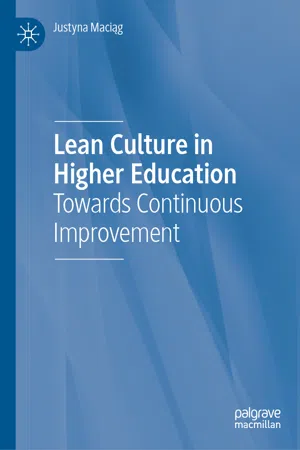1.1 Reasons for Undertaking Research on Lean Culture in Higher Education
The contemporary university is an organisation full of tensions (Geppert and Hollinshead 2017), “suspended” between tradition and modernity (Leja 2013; Kwiek 2015; Antonowicz 2015; Sułkowski 2016). Some researchers are of the opinion that in the globalising economic, cultural, and social environment, the mission of the university as an institution dedicated to the education of the nation for the purpose of strengthening the state is being exhausted (Kwiek 2001). The severance of the strong connections between knowledge and power causes a change in the nature of knowledge and the process of its creation, accumulation, and transfer. Knowledge becomes the subject of commercialisation, a mainly private product/service provided based on competitive conditions and in the quasi market conditions. The market viewpoint manifests itself through the shared conviction of the adequacy of the concepts of New Public Management (NPM) and the enterprising university for the understanding of the nature of the contemporary university and the manner of its management. Universities implement process management concepts coming from manufacturing enterprises (Maciąg 2016). It is assumed that these two concepts will be as effective in universities as they are in business organisations, despite the fundamentally different character of the former. However, it may be problematic to maintain the continuity and permanence of introduced changes. This may result from the fact that universities often implement pseudo-changes in order to appear more attractive to stakeholders (Alvesson 2013). Their lethargy, inertia, and focus on self-recreation are explained by compulsive isomorphism (Santana et al. 2010), conflicts of values (Lenartowicz 2016), strong organisational identities (Sułkowski 2016) or traditional organisational culture (Balzer 2010; Emiliani 2015).
An analysis of the literature on the subject indicates that universities turn away from process approaches popular at the end of the twentieth century such as Total Quality Management (TQM) or Business Process Reengineering (BPR), opting for the concept of Lean Management in the belief that its implementation would contribute also to changes in organisational culture . In order to stress the specificity of the Lean Management concept in higher education researchers use such terms as Lean Higher Education (Balzer 2010), Educational Lean for Higher Education (Waterbury 2011), Lean University (Emiliani 2015).
There are more and more publications on Lean Management in higher education. Conducted research indicates that Lean Management generates positive effects in the organisational and technical system, but there are doubts about the permanence of such results (Radnor and Bucci 2011; Balzer 2010; Emiliani 2015; Antony 2014; Hines and Lethbridge 2008; Yorkstone 2016; Francis et al. 2017; Balzer et al. 2016). Resistance and a lack of continuity of introduced changes are explained by too little attention being paid to the development of an organisational culture of Lean Management —a Lean Culture (LC) (Francis et al. 2017).
An analysis of the literature of the subject shows that the issue of cultural conditions for implementing Lean Management in higher education has not been discussed sufficiently enough. There is a lack of definitions, theoretical models, concepts, methodologies of building a Lean Culture and assessing its maturity as a higher education organisational culture . Furthermore, in the functionalist paradigm used currently to assess the effects of cultural changes, which is based on superficial “production-oriented” measures, it is impossible to understand fully the essence and maturity of the university for the implementation of Lean Management . The objectivist approach causes researchers to study organisational culture from the outside, similarly to how representatives of natural sciences do this (Jo Hatch and Schultz 1997). Therefore many authors propose broadening the research perspective based on the functionalist approach with a humanistic approach based on the interpretative-symbolic paradigm (Jo Hatch and Schultz 1997; Kostera 2003; Alvesson 2009; Czarniawska 2010; Sułkowski 2012; Zawadzki 2014; Weick 2016). In such an approach, Lean Culture is defined as an epistemological metaphor of an organisation (Kostera 2003). It is considered at the level of people’s relationships and personal experiences (Sikorski 2009, p. 13). Sharing this opinion, the author decided that adopting this ontological approach would allow her to acquire a deeper understanding of the sense of implementing Lean Management in higher education.
The main reasons for writing this book were the author’s need to discover in what way the concept of Lean Management chan...
